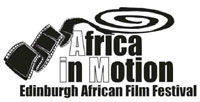
Top stories






More news
















Last year's festival focused on conflict and reconciliation across the continent, in keeping with the declaration of 2009 as the UN International Year of Reconciliation.
As a tribute to AiM's role in drawing international attention to issues of reconciliation, it received a commendation from UN Secretary-General Ban Ki-Moon.
The 2010 theme of celebration marks a number of auspicious occasions. Besides AiM's fifth anniversary, there are 17 African countries that celebrate 50 years of independence this year. Among them are Nigeria (1 October), the Democratic Republic of Congo (30 June), Cameroon (1 January), Côte d'Ivoire (7 August), Madagascar (26 June), and Senegal (20 August).
The others are Togo, Somalia, Benin, Niger, Burkina Faso, Chad, the Central African Republic, Congo, Gabon, Mali and Mauritania.
Festival founder and director Lizelle Bisschoff obtained her BA in Communication Theory and BA (hons) in Literary Theory and Audiovisual Production Management at the University of Johannesburg.
She recently completed her PhD at Scotland's Stirling University, conducting research into the role of women in cinema in the sub-Saharan region.
She established AiM because during her research she found it difficult to gain access to African cinema works in Scotland. The festival also gives African filmmakers a platform to show their work to audiences that, on the whole, know very little about the continent's vibrant film industry.
With more than 70 films from 28 countries, including South Africa, film lovers can expect a feast of innovation and creativity around the central themes. Films are also screened according to the specific theme of the day - these include North Africa, children, dance, sport, Nelson Mandela, and the environment, among others.
The festival arranges a range of accompanying events for those who are interested in other artistic genres. Children can attend an animation workshop; the Scottish Poetry Library presents the Poetry in Motion gathering; veteran Cameroonian director Jean-Marie Teno leads a free masterclass in documentary filming at the Edinburgh College of Art; and the Filmhouse Guild Room hosts an afternoon of African storytelling.
Some of the films will gain further exposure through a tour of the rural Scottish areas of Fife, Cromarty, Orkney and Skye later in November.
Full details of all the events, dates and venues are available on the Africa in Motion website, and film lovers may book online to see the productions of their choice.
Trailers, shorts and interviews may also be viewed on AiM's online television channel.
South Africa is represented by a variety of short and full-length films that offer a fascinating glimpse of the country and its people.
The film City Breath is a collection of diverse short films, or breaths, of South African cities. No segment is longer than four minutes, and through these 20 experimental shorts, the project offers insight into the way South Africans view their cities.
Made in 1994, Voices from Robben Island is a documentary on the notorious island where political prisoners were jailed for many years at a time. The film examines the island's 400-year history and profiles some of its most famous inmates - Nelson Mandela, Walter Sisulu, Govan Mbeki, Ahmed Kathrada, and others.
The other film honouring former president Nelson Mandela is titled Welcome Nelson. This is an intriguing 23-minute montage of original footage from 11 February 1990, the day he was released from a 27-year prison sentence.
The documentary Fezeka's Voice profiles Phumi Tsewu, for the past 12 years the choirmaster of the award-winning Fezeka High School Choir. Through his guidance and inspiration, 77 youngsters from the underprivileged Western Cape township of Gugulethu have used music to lift themselves out of their everyday lives, which are often filled with hardship. Their work in the choir has given them a sense of belonging, acceptance and pride.
The dance documentary Freedom follows five South African dancers as they express their individual concepts of freedom and democracy through their art.
Visual artist Nico Phooka and playwright Fatima Dike collaborate in the documentary Amagagu: Dreaming the New. The film also explores their personal backgrounds, cultures and beliefs.
The Silver Fez is a documentary featuring Cape Town's famous Malay musicians. The film provides a glimpse into the Malay subculture and the age-old musical traditions that help to sustain it.
Passion Gap is another collection of snippets of South African life, filmed among the young people of Cape Town. The title refers to the tradition of dental modification - or quite simply the removal of the front teeth - favoured by many coloured people of the Western Cape as a fashion statement and rite of passage. The missing teeth are replaced by dentures often outrageously decorated with gold, silver or precious stones.
Cape Town as an adventure destination is the subject of Unfinished Business, a film that probes the culture of thrill-seeking associated with the city's world-famous Table Mountain.
Set in 1993, uGugu no Andile (Gugu and Andile) is a film about a Zulu girl who falls in love with a young Xhosa man. In Romeo and Juliet style, their union results in disapproval from both communities, and in the troubled political climate of the time, the pair becomes caught up in violence and uncertainty.
MediaClubSouthAfrica.com is hosted by the International Marketing Council of South Africa (IMC), the custodian of Brand South Africa. The site is a free service for all media professionals - journalists, editors, writers, designers, picture editors and more - as well as for non-profit organisations and private individuals. Its specific focus is on South Africa and Africa.
Go to: http://www.mediaclubsouthafrica.com/
